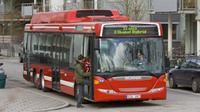World's Largest Ethanol Bus Fleet Grows by 85 New 270 HP Scania Buses
SEE ALSO:Scania Presents the Bus of the Future: World-Premire for Scania's Ethanol Hybrid Bus (Originally Published May 2007)
SEE ALSO: There Is a Single Solution To No More Petroleum Based Fuels NOW!
SEE ALSO: Alcohol and Driving DO MIX
Compared to a conventional diesel engine, ethanol-powered vehicles can reduce fossil carbon dioxide emissions by up to 90 percent
STOCKHOLM--Scania is delivering 85 ethanol-powered buses to Nobina, which operates on behalf of the Stockholm regional public transport company, Storstockholms Lokaltrafik (SL). Ethanol buses will help SL fulfil its decision to invest only in buses that operate on renewable fuels starting in 2010.
The order includes buses for city, suburban and regional traffic to be stationed at SL's depots in Bromma, Tyres and Sdert outside central Stockholm. Deliveries will begin in August. The buses will be equipped with Scania's third generation five-cylinder 270 hp ethanol diesel engines, which meet Euro 5 and EEV emission standards.
Scania has more than 20 years of experience with ethanol buses. The company has delivered a total of about 700 ethanol buses, more than 600 of them to Swedish cities. In recent years, Scania has also delivered ethanol buses for commercial service in Great Britain, Spain, Italy, Belgium, Norway and elsewhere.
Stockholm, the capital of Sweden, has the world's largest fleet of ethanol buses, and as recently as during the past year, Scania delivered 85 ethanol-powered articulated buses for operation in SL's service area.
SL's owner, the Stockholm County Council, has set a target that at least 50 percent of all passenger transport in its territory should occur using renewable fuels by 2012. At the end of 2009, the figure was nearly 30 percent.
Ethanol accounts for around 90 percent of renewable fuel vehicles available today. It is the most cost-effective such fuel in the market in terms of availability, infrastructure and access to tried-and-tested technology.
Compared to a conventional diesel engine, ethanol-powered vehicles can reduce fossil carbon dioxide emissions by up to 90 percent.
Scania is one of the world's leading manufacturers of trucks and buses for heavy transport applications, and of industrial and marine engines. A growing proportion of the company's operations consists of products and services in the financial and service sectors, assuring Scania customers of cost-effective transport solutions and maximum uptime. Employing 32,000 people, Scania operates in about 100 countries. Research and development activities are concentrated in Sweden, while production takes place in Europe and South America, with facilities for global interchange of both components and complete vehicles. In 2009, invoiced sales totalled SEK 62 billion and net income amounted to SEK 1.1 billion. Scania press releases are available at www.scania.com



